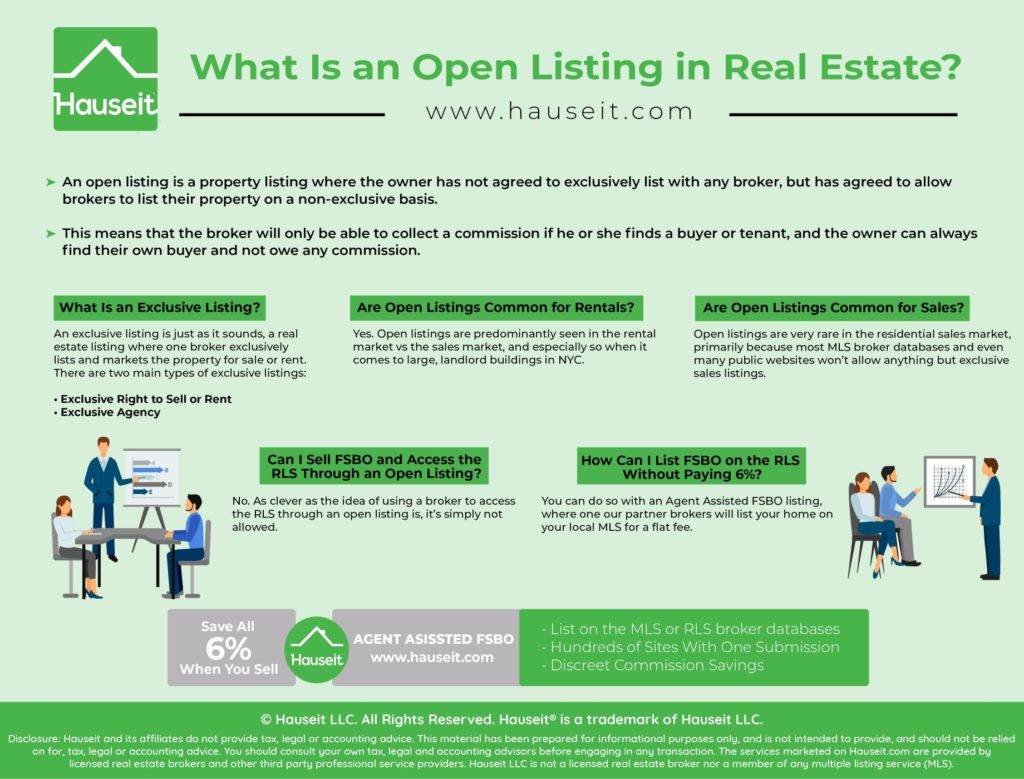An open listing means that a homeowner has agreed to allow one or more brokers to list their property on a non-exclusive basis. In other words, no single agent has the exclusive right to advertise the property and earn a commission.
This means that a broker will only be able to collect a commission under an open listing arrangement if he or she procures the buyer or tenant. Moreover, an owner can always find their own buyer and not owe any commission.
Table of Contents:
An exclusive listing means that only one broker is authorized to advertise property for sale or rent during the term of the listing agreement. Unlike with an open listing, this means no other agent is allowed to simultaneously market the property while the exclusive listing agreement remains in effect.
There are actually two common variants of exclusive listings:
-
Exclusive Right to Sell or Rent Listing
-
Exclusive Agency Listing
Exclusive Right to Sell or Rent Listing
An exclusive right to sell is the most common type of sale listing. In an exclusive right to sell listing, the listing broker is the only one who can list and market the property. The listing agent is entitled to collect a collect commission if the property sells regardless of who finds the buyer or tenant.
If the buyer is represented by a broker, the listing broker will typically split the commission with the buyer’s broker.
Exclusive Agency Listing
This type of listing agreement is less common. In an exclusive agency listing, the listing broker is still the only person who can list and market the property. However, if the owner finds a buyer or tenant by themselves, they do not owe any commission to the listing broker.
A Full Service Listing for 1%
Sell your home with a traditional full service listing for just one percent commission.
Open listings are much more common for rentals vs. sales. This is especially so when it comes to large, landlord buildings in NYC.
These landlord buildings are essentially entire apartment buildings that are owned by one landlord, and where all or almost all of the units are rentals.
While many individually owned condo and co-op apartments will still be listed exclusively by a single broker, most large rental buildings will not have an exclusive listing agent.
This is because these landlords are institutional in nature, and have a history of paying commission to brokers for bringing renters. As a result, they don’t need a broker to list it on their behalf in the REBNY RLS, because doing so essentially provides credibility.
Furthermore, many of the building landlords don’t want to bother with marketing their own properties, and the associated expenses with doing so. For example, StreetEasy charges a hefty daily fee for rental listings, and this can really add up if you’re marketing many apartments at the same time. And that’s just one website!
However, real estate agents are often more than happy to market open listings because it’s a way of generating leads, even if it costs them money to advertise the landlord building apartments on various websites.
Open listings are very rare in the residential sales market, primarily because most MLS broker databases and even many public websites won’t allow anything but exclusive sales listings.
As a result, buyers typically have an easier time navigating the sales market because there is only one agent listing each property, which results in far less confusion vs the rental market.
For example in NYC, REBNY only allows exclusive sales listings to be uploaded to the REBNY RLS broker database. Furthermore, public search websites like StreetEasy will only accept exclusive sale listings, and will sometimes ask brokers for proof of exclusivity. As a result, virtually every residential sales listing in NYC is an exclusive listing.
No. As clever as the idea of using a broker to access the RLS through an open listing may sound, it’s simply not allowed.
The REBNY RLS specifically prohibits non-exclusive sales listings to be uploaded to the broker database, and any broker who surreptitiously uploads an open listing can suffer fines and other penalties.
Furthermore, many MLS systems such as the Hudson Valley’s HGMLS will require the listing broker to upload the actual signed listing agreement for review by the MLS staff.








